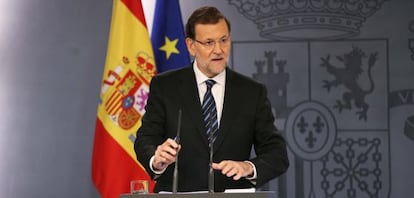Spanish PM calls unofficial Catalan sovereignty vote a “failure”
Rajoy says he will not negotiate a binding referendum with regional premier Artur Mas

In his first media appearance since the unofficial vote on Catalan sovereignty was held in the region on Sunday, Spanish Prime Minister Mariano Rajoy did not budge from his position a single inch, once again roundly rejecting the validity of the process. “It was not a democratic vote, it was an act of political propaganda,” he told reporters at La Moncloa prime ministerial palace on Wednesday. “There was no consultation, it was a sham.”
He went on to state that he would offer no special plan to stop the independence movement from growing in Catalonia because he believed the poll had been a “complete failure” – above all because two-thirds of Catalan citizens and foreign residents in the region eligible to vote did not go to do so.
“It was a profound failure of the secessionist project,” said Rajoy. “According to its own figures, two out of every three Catalans ignored it. Where they claimed a show of their strength, they demonstrated their weakness.”
Rajoy ruled out any possibility of negotiating an official referendum and laid out what he considered to be the only path open to regional premier Artur Mas to achieve his aims: constitutional reform. “It is the only legal way,” Rajoy said. “The Catalan parliament is empowered to begin the process of constitutional reform. It is the only legal path for his proposals and Mas knows it.”
It was not a democratic vote, it was an act of political propaganda. It was a sham” Prime Minister Mariano Rajoy
He said that during his negotiations with the Catalan leader he always set this path out as the one to follow. But he also made clear that it was a firmly closed door, saying that he and his Popular Party (PP) would oppose any reform of the Constitution “that includes self-determination and thus eliminates national sovereignty.”
“I am never going to negotiate national sovereignty,” he stressed.
Rajoy based all of his arguments on the fact that the low turnout showed that the independence movement was a minority force. “In Catalonia there are many more Catalans than supporters of independence. Catalonia is plural, very plural,” continued Rajoy, who declined to comment on the legality of the process, about which the Attorney General’s Office is now preparing a lawsuit.
The prime minister defended himself from criticism he has received from various fronts about his do-nothing policy over the Catalonia vote: “The government has defended the law and has adopted a sensible and adequate stance. Some organizers would have liked another kind of picture and the government has acted proportionately, as have the courts.”
He also praised the decision made by a Catalan judge not to act when given a request to have ballot boxes seized. “It would have created more tension and difficulties,” he said.
Faced with a barrage of questions about the judicial appeal against the November 9 vote, Rajoy referred to the autonomy of the Attorney General’s Office. “I am not in a position to tell it what it has to do,” he said. “I have to respect the decision of the public prosecutor and of the judiciary because if I didn’t, we would not be going down the right path. Believe me when I say I do not know if they are going to file a complaint. I have given no instructions in this sense,” he answered.
Rajoy called on Mas to “get to work on what matters to the collective of citizens in Catalonia”
Rajoy called on Mas to “get to work on what matters to the collective of citizens in Catalonia,” such as unemployment and economic problems. He pointed out that Mas “has devoted himself solely and exclusively to this project, which has ended with a lower turnout than predicted.”
The prime minister’s remarks come three days after, according to Catalan government figures, 2.3 million people voted in the alternative November 9 vote on independence for Catalonia. His press conference had generated a huge amount of expectation and took place just a short while after Mas had told the Catalan parliament that if the Attorney’s General Office acts against him and other members of his government over the poll it would transmit a “shocking image for Spain.”
Rajoy has received internal criticism from the more conservative parts of the PP – as well as from the centralist Union, Progress and Democracy (UPyD) and right-wing Vox parties – for not adopting measures to prevent Sunday’s vote from taking place.
Tu suscripción se está usando en otro dispositivo
¿Quieres añadir otro usuario a tu suscripción?
Si continúas leyendo en este dispositivo, no se podrá leer en el otro.
FlechaTu suscripción se está usando en otro dispositivo y solo puedes acceder a EL PAÍS desde un dispositivo a la vez.
Si quieres compartir tu cuenta, cambia tu suscripción a la modalidad Premium, así podrás añadir otro usuario. Cada uno accederá con su propia cuenta de email, lo que os permitirá personalizar vuestra experiencia en EL PAÍS.
¿Tienes una suscripción de empresa? Accede aquí para contratar más cuentas.
En el caso de no saber quién está usando tu cuenta, te recomendamos cambiar tu contraseña aquí.
Si decides continuar compartiendo tu cuenta, este mensaje se mostrará en tu dispositivo y en el de la otra persona que está usando tu cuenta de forma indefinida, afectando a tu experiencia de lectura. Puedes consultar aquí los términos y condiciones de la suscripción digital.








































